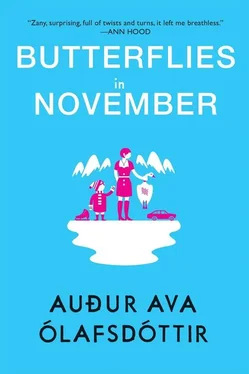“Can you collect Tumi from the kindergarten for me and keep him over the weekend, I don’t want to involve Mom in any of this, not yet at least, her blood pressure is far too high. The only thing you need to watch out for is his sleepwalking, he’s been known to open doors and vanish behind corners, and even to put himself in danger. Once I found him down by the lake. Just make sure you don’t startle him when he’s in that state.”
“OK,” I say.
“He also likes to feel a lock of hair brushing across his face when he’s falling asleep. I find it also reduces the likelihood of him sleepwalking,” says my friend with the long ponytail.
“I’ll bear that in mind.”
“ Hakúna matata !” she cries out to me. That’s Swahili for “don’t worry”, by the way, from The Lion King , his favourite movie. She waves me goodbye, beaming from ear to ear.
I’m left standing in the unsalted slush, in the pale grey light of noon, with a bag containing brown rice, an organic vegetarian dish and apricot mousse in little paper boxes. For the sake of making some token gesture, I sprinkle the steps with salt.
Although I wouldn’t want to add to Auður’s worries in her current state, it’s got to be said: I haven’t a clue when it comes to children. There were no younger siblings in my house. The neighbourhood I grew up in as a kid was mainly populated by old people. No one ever came to pick me up to babysit a little cousin and, in the countryside in the east, all the other kids were around my age, and there were no smaller children to interfere with our plans in the attic of the barn.
I walk off to collect him, with the sky above me and, hopefully, the Almighty himself. An entire weekend is a very long time to have to spend alone with a child, a non-stop forty-eight-hour watch to be exact, under my constant responsibility. That makes at least eight meals, four of which would have to be hot, and brushing his teeth five to six times. In fact, the only way to plan this is from one half-hour to the next. Children’s games last for about five minutes, after which you’ve already got to think of something new. It must slow everything down; one would have to put everything else on hold, I imagine.
Gnome House certainly lives up to its name; its low multi-coloured wooden structure, wedged between higher buildings, seems oddly incongruous in this district. Inside everything has been dwarfed down to scale in a nannified universe. As you step in, you turn into a Gulliver in Lilliput and have to watch you don’t tread on any of the small folk that live their minuscule lives here from eight to five, five days a week.
I spot him immediately. He stands out in the crowd, with his unusually big head for such a short trunk, slightly drooping shoulder blades and a rather old-fashioned hearing aid for such a young child. His big ears protrude through his hair. His mother had told me he wants to keep his hair long, to cover those ears. Having been premature by two and a half months, he is considerably smaller than his peers. His torso also seems oddly proportioned, an old man locked in the body of a child.
“I normally buy clothes for him that are twice or three times below the size of his age, mostly French children’s sizes,” Auður told me.
What’s more, the boy wears glasses that are attached by springs to the hearing aid behind his ears and his eyes seem to almost completely fill the lenses. He has a look that often attracts attention, frequently evoking pity, Auður says, particularly from old women, who sometimes pull sweets out of their pockets.
He instantly recognizes me and seems visibly happy to see me. Wrapping his arms around my waist for a brief moment, he looks up at me intently as he speaks and then patiently waits for me to give him some sign of understanding and recognition. Because I don’t know sign language, he strives to speak as clearly as possible, exaggerating his lip movements and equally stressing every syllable as he forms the sounds that he himself can only barely hear. Nevertheless, his voice sounds strange and I have problems grasping what he is saying. I squat so that we can at least look each other in the eye when he’s talking.
“We had a special mushroom day today, the kindergarten teacher interprets,” although I’m convinced he was trying to say something else to me. “Few of the kids wanted to eat the mushrooms we were offering, one of them retched and threw up on the table. This week we’re focusing on the sense of taste,” she continues to explain, “in connection with the globalization theme and in collaboration with the Intercultural Centre.”
“We offer a mixture of national and international foods, now that all the borders are opening up to investment. We had a buffet with all kinds of delicacies on toothpicks for these little fingers to taste: black olives, fermented whale, mozzarella, feta cheese, French goat’s cheese, blood pudding, dried fish and mushrooms.”
The boy dutifully hands over several drawings of mushrooms, sketched both from the side and above, as if to illustrate the woman’s speech. In addition to this, he is holding in a plastic bag two mushrooms, which have been dissected in half to examine their interior.
Questions requiring immediate answers spring to mind. Are two mushrooms enough for the dinner of a four-year-old? Should I put him into his overalls or will he be offended? Does he want to do it himself? Is what he wants also what is best for him? Do the two go hand in hand? If not, how am I to distinguish between the two?
Auður has phoned the school in advance and the woman decides to spell it out for me:
“The guiding principle we work under here at Dwarf House is that each individual is unique and different,” says the kindergarten teacher. We believe in the strength of those who are weak and have had to overcome obstacles and are therefore, in a certain way, stronger than the others. If one sense is defective, another sense will often compensate by becoming super-sensitive, like the hearing of the blind, for example, or the sight of the deaf.”
I resist the temptation to mention Tumi’s glasses and hearing aid in the same breath.
“If a person is different, that can also make them a little bit special,” interjects some proper little madam who is slipping into some woollen socks.
“Exactly, Geirthrúdur,” says the kindergarten teacher emphatically, “that’s what we’re focusing on in our group work.”
“I’ve got freckles and my grandad has cancer,” the little girl continues.
“Exactly, that’s the idea.”
The child is then given a sign to let her know that her contribution to the conversation must now end and the woman turns back to me.
“We have a child here with a Senegalese father, obviously Tumi, who has serious hearing difficulties, hyperactive and development-impaired children, children way over the ideal weight, children with same-sex parents. .”
I finally pluck up the courage to dress Tumi in his blue winter overalls and to put on the balaclava he hands me, at least I can do that much. Temperatures have risen by eight degrees since yesterday.
“If the weather forecast is anything to go by, it’ll be puddle gear after the weekend,” says the woman, “we love our puddles, don’t we, Tumi?” Then she turns back to me again and says in a warm confidential tone:
“Some hate fighting, others love splashing. To be honest, we’re concerned about how little communication he has with the other children. Above all, he prefers to be left alone or to play with the girls in the doll corner. We’re trying to build up his self-esteem, but he categorically refuses to fight, there’s no hunting instinct in him, no conquering. He always stands at the back of the group, avoiding conflict. If he were a sea lion he’d be the first one to be slaughtered by the males and he’d never get to reproduce. Aggression needs a healthy outlet if it is to be channelled into creativity and we’ve tried different methods to toughen him up. Even though we don’t allow weapons, we turn a blind eye to the kids that use sticks as guns. Tumi, on the other hand, engages the sticks in a sign language conversation, one as granny and the other as grandad.”
Читать дальше












